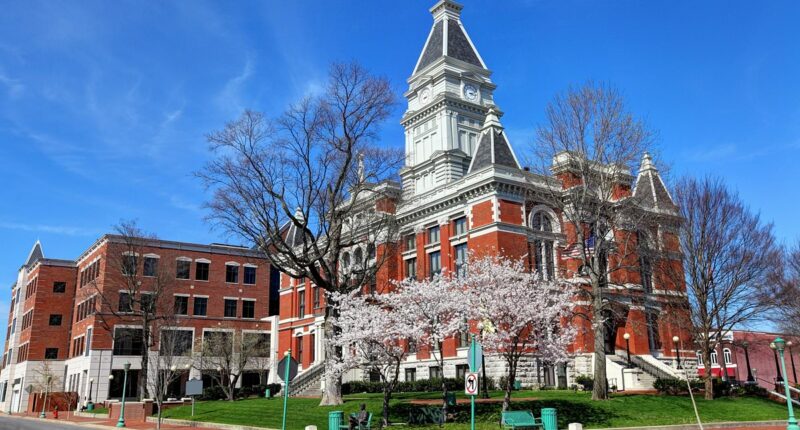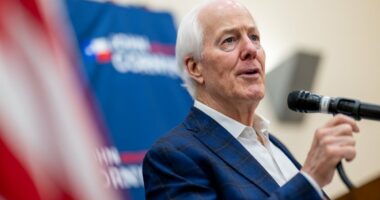Share this @internewscast.com
Previously known for its historic Victorian architecture and small-town appeal, Clarksville, Tennessee, now faces the challenges of rapid growth as it emerges as one of America’s fastest-growing cities.
The population of this military town, located near the Kentucky border by Fort Campbell, has surpassed 186,000, an increase of nearly 20,000 over four years. This surge has outpaced the housing market, driving up prices and leaving many residents struggling to secure accommodation.
A new housing study warns that the shortage spans both rental and for-sale properties, with limited supply and a lack of variety in available homes.
The situation is pushing some residents to allocate too much of their income to housing costs, which hinders local spending and poses a threat to the city’s long-term economic sustainability.
City officials recognize the issue, but the rapid growth has made it difficult to balance development with infrastructure needs while maintaining the historic charm that originally attracted people.
Councilmember Deanna McLaughlin described the situation as ‘urgent’, citing a significant five-year housing deficit of over 15,000 units, including 8,595 homes for sale and 6,598 rentals at various price levels. She also noted that both affordable and market-rate rentals are almost fully occupied.
‘Limited options and rising costs are creating a significant cost burden for residents,’ she said.
‘We have 43.6 percent of renters and 20 percent of homeowners spending over 30 percent of their income on housing, which surpasses the state average. Income levels are simply not keeping up with the rising cost of living.’

Clarksville’s population has surged by nearly 20,000 in just four years, making it one of the fastest-growing cities in the United States

Councilmember Deanna McLaughlin (pictured) called the situation ‘urgent’, pointing to a severe five-year housing gap of more than 15,000 units
Local real estate agent Tyler Forte, who services Clarksville from his base in Nashville, says the city has undergone a dramatic transformation in just a few years.
‘Even three years ago, Clarksville was kind of Nashville’s stepsister – known mainly for the military base and university, with a lot of farmland and a small-town feel,’ Forte said.
‘Since COVID, it’s just absolutely taken off. They’re building a ton of homes and commercial projects, new grocery stores, and even two new hospitals. It’s gone from being an afterthought to a major city in Tennessee.’
Much of that growth, Forte says, has been driven by both out-of-state buyers and Nashville residents seeking a lower cost of living.
‘As Nashville prices have climbed, I’ve had a lot of clients who’ve moved to Clarksville for more affordable housing,’ he explained.
Forte notes that new construction dominates the market, which can be a double-edged sword.
‘Most of the homes I see in Clarksville are brand new – even something built in 2015 is considered old. Builders are offering big incentives, like interest rate buy-downs through their preferred lenders.
One client just locked in a 3.99 percent rate through Lennar’s in-house lending program – a huge drop from the 6.5-7 percent you’d see with a typical lender.

Clarksville, Tennessee, is located roughly 40 minutes northwest of Nashville, along Interstate 24

Local real estate agent Tyler Forte says Clarksville has transformed from a quiet military town into a booming city, with new construction dominating the housing market
‘Because the builder owns the lender, they can offer aggressive financing deals that make new construction especially attractive,’ he said.
While bidding wars aren’t as common as they once were, Forte says competition still exists for certain properties.
‘If a home is unique, move-in ready, and priced right, it can still spark multiple offers. But out of the 80 homes I sold in the past year, only about three had bidding wars.’
Some parts of the city remain hotter than others. ‘The Sango area in the south is the most competitive,’ Forte said.
‘It’s closer to Nashville, has a strong school district, and that combination is always going to drive demand.’
However, Forte doesn’t believe the real shortage is in housing stock.
‘They’re building as fast as they possibly can,’ he said.
‘The bigger issue is infrastructure. This was mostly farmland 10 years ago, and the public systems just aren’t built to handle this kind of population growth so quickly.’

A new housing report warns of a severe shortage of affordable homes in Clarksville (pictured) as demand continues to outpace supply

Many residents feeling priced out of Nashville have been moving to Clarksville according to local realtor Tyler Forte. Pictured: Famous Neon signs of blues clubs on Beale street illuminated at night in downtown Nashville
Although the boom has brought new businesses and job opportunities, it has also fueled concerns about traffic congestion, rezoning battles, and environmental impacts in a city where Victorian-era streets and landmarks now sit in the shadow of sprawling new subdivisions.
McLaughlin said younger residents and first-time buyers are especially hard-hit, with many unable to qualify for mortgages and a shortage of smaller ‘starter’ homes in the market.
She warned that building quickly without careful planning could worsen traffic congestion, strain public services, and erode the character of historic neighborhoods.
‘If the housing shortage persists, the most pressing concerns would be an increase in the number of cost-burdened residents, particularly those in lower- and middle-income brackets,’ she said.
‘That could lead to the departure of essential workers and drive prices even higher,’ she added.
Patrick Bowen, president of Bowen National Research, led the assessment that laid bare Clarksville’s housing shortage – and its wider economic consequences.
‘Whether it’s rental or for-sale housing, there’s not much available,’ Bowen told local FOX affiliate WZTV Nashville.
‘And what you do have is really not affordable for many low- to moderate-income households.’

Former farmland across the city is being transformed into sprawling new subdivisions as builders race to meet the housing demand

Clarksville is near Fort Campbell that sits on the border of Kentucky and Tennessee
He warned that rising housing costs don’t just hit residents – they ripple through the local economy.
‘When you’ve got people spending exorbitant amounts on housing, that’s less money going back into the local economy. It has an impact on employers, too; the workforce can’t afford to stay in the market, or afford the rent they’re paying.’
Bowen says the newly compiled data can help Clarksville plan smarter: ‘Now you have data to look to, so when you’re setting priorities and goals, you have something that gives you structure, to say, we need to focus on this type of housing or this population.’
He also stressed that rushing development could make matters worse.
‘Yes, housing is needed quickly, but that doesn’t mean it should be rushed. You want to make sure you’re building the right kind of housing, in the right places, with the right infrastructure in place.’
And the solution, he says, requires more than just City Hall.
‘If anybody expects just local government to fix this, you’ve underestimated how big and complex the problem is. There needs to be a community-wide conversation involving nonprofits, employers, housing advocates, and residents.’
















